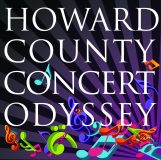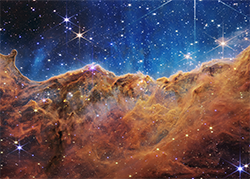As NASA releases the first images from the James Webb Space Telescope, we can’t help but be inspired by the wonder of space. Not surprisingly, classical composers over the years have also been inspired by the heavens. Here are five cosmic compositions worth checking out.
Naturally, that first work that comes to mind is The Planets by Gustav Holst. A powerful composition comprising seven movements, it honors the planets Mars, Venus, Mercury, Jupiter, Saturn, Uranus, and Neptune. Fun fact: Pluto wouldn’t be discovered for another 15 years after Holst composed this work.
This list wouldn’t be complete with the theme from 2001: A Space Odyssey. But did you know that the work, Thus Spoke Zarathustra, was originally composed in 1896 by Richard Strauss? The timpani part for this music is iconic; in fact, Leonardo Soto, Houston Symphony principal timpanist, said, “It is not only a part that every timpanist knows, but also is in most timpani auditions for any orchestra.”
Alan Silvestri’s All That Is or Ever Was or Ever Will Be, composed in 2014 as the theme for the documentary TV. series Cosmos: A Spacetime Odyssey, was so popular with viewers that it won two Emmys. Listen to the full score here.
An even more recent work is the Rosetta Timeline by Greek composer Vangelis. Released in 2016, this work was dedicated to the European Space Agency’s Rosetta space probe mission. The Rosetta probe’s purpose was to study a particular comet, but it also performed flybys of Earth, Mars, and two asteroids.
What better piece to round out our list than Eric Whitacre’s Deep Field: Earth Choir? This composition was inspired by the Hubble Space Telescope and its discovery of “deep fields,” which refer to images of distant galaxies created by collecting light for a long time. These glimpses deep into space show us how the universe may have looked far in the past.
And now for something a little different: Back in July 2018, German astronaut Alexander Gerst joined the band Kraftwerk (known for electronic music) from the International Space Station via video link to perform one of their songs. Check it out here.

